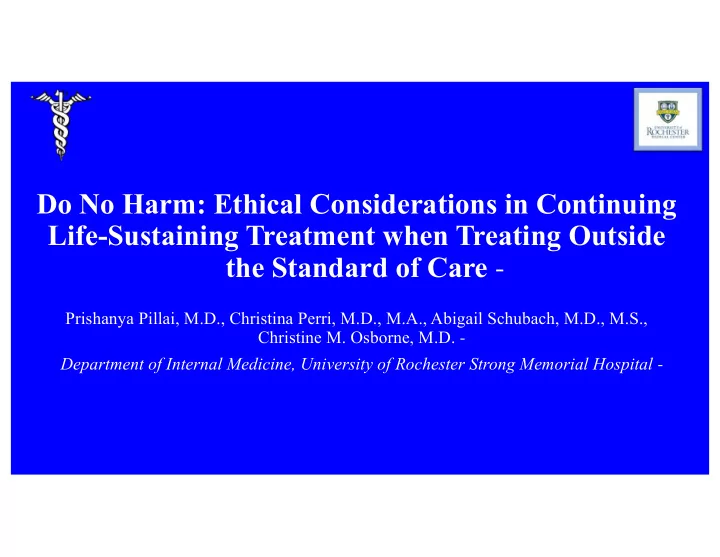

Do No Harm: Ethical Considerations in Continuing Life-Sustaining Treatment when Treating Outside the Standard of Care - Prishanya Pillai, M.D., Christina Perri, M.D., M.A., Abigail Schubach, M.D., M.S., Christine M. Osborne, M.D. - Department of Internal Medicine, University of Rochester Strong Memorial Hospital -
Ethical Questions Does a surrogate’s decision to forego the standard of care change the care team’s obligation to continue life-sustaining treatment in a patient with uncertain prognosis? What is an appropriate treatment goal when treating outside the standard of care for patients who lack capacity and do not assent?
Case Presentation - • HD 1: 50-year-old male with history of sickle cell disease and schizophrenia who presented with vaso-occlusive crisis. On admission, he was psychiatrically compensated, elected full code status, and did not name a healthcare agent. • HD 3: Patient developed lethargy and confusion and was found to have bowel perforation. Deemed to lack capacity at this time. • Patient’s mother, who was legal next-of-kin, was appointed surrogate decision-maker. • Surrogate declined surgery but requested maximal medical therapy. • Of note, patient had declined surgery for suspected bowel perforation 1 year prior. • Patient did not assent to medical therapy with IVF, IV antibiotics, and TPN. Patient removed IV access frequently, requested to go home.
Discussion • Ethical obligation to minimize the patient's suffering regardless of the success of medical treatment • Moral reluctance to treat over objection • Can a patient without decision-making capacity still have capacity for preferences? And do these preferences have moral value? What is the role of assent when patients cannot consent? • Primary endpoint for the care team was to work towards restoring the patient’s capacity to make his own decisions • Time-limited trial of therapy can be a useful tool to assess prognosis when clinical outcome is unclear • Useful when chances of a meaningful outcome are unclear or when surrogate decision-makers express difficulty in making care decisions • Core elements: Multidisciplinary team approach, palliative care, ethics committee, clear and ongoing communication • Provide daily updates to families: empathy, reaffirm preferences, spiritual/moral needs, short updates on clinical status
Recommend
More recommend